Professional Development and Educational Conference Presentations
Like many other educators, I take the show on the road every now and then. In person and by Zoom. If you would like to book one of these professional learning sessions, workshops, or talks, please contact me for more information. Relevant experience detailed in my CV. These can all be adapted or synthesized to fit your audience. e.g. elementary, secondary, post-secondary. Have a look at the TTSP project - this can also provide some ideas about topics your group may wish to hear more about.
Workshop Topics
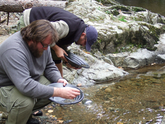
Place-Responsive Storywork
Students are natural storytellers; they have an innate ability to explore the world through their senses and commit ideas, knowledge, and understanding to memory through story. In this workshop, teachers will develop their capacity for place-responsive learning, and the use of narrative as a classroom tool for teaching, learning, and assessment. We will also weave the use of geographical and historical thinking skills with an appreciation for Indigenous ways of knowing, diverse access points for curricular content, and activation of pedagogies. This workshop can be outside or inside, Gr. 4-12. 2-3 hrs
Students are natural storytellers; they have an innate ability to explore the world through their senses and commit ideas, knowledge, and understanding to memory through story. In this workshop, teachers will develop their capacity for place-responsive learning, and the use of narrative as a classroom tool for teaching, learning, and assessment. We will also weave the use of geographical and historical thinking skills with an appreciation for Indigenous ways of knowing, diverse access points for curricular content, and activation of pedagogies. This workshop can be outside or inside, Gr. 4-12. 2-3 hrs
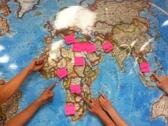
Building the Room: Teaching and Assessing Humanities
What is the purpose of Social Studies or English Language Arts? What methods should we use to develop creativity and critical thinking in students? What should the teacher do in a classroom? What should the students do? How do you assess the work that students produce? This workshop goes back to the design basics, providing teachers with the confidence to "teach who they are" and create authentic learning experiences in a safe and challenging environment. Plenty of usable examples. Great for new teachers and experienced teachers who want to re-examine their approach to Social Studies or English. Gr. 6-12. 1.5-2 hrs
What is the purpose of Social Studies or English Language Arts? What methods should we use to develop creativity and critical thinking in students? What should the teacher do in a classroom? What should the students do? How do you assess the work that students produce? This workshop goes back to the design basics, providing teachers with the confidence to "teach who they are" and create authentic learning experiences in a safe and challenging environment. Plenty of usable examples. Great for new teachers and experienced teachers who want to re-examine their approach to Social Studies or English. Gr. 6-12. 1.5-2 hrs
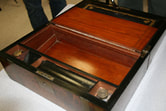
Heritage Inquiry - Students as Master Storytellers
Connecting students to Social Studies curriculum through project-based learning. History is remarkably close at hand -- every family and community has stories that link past and present generations, cultural truths, and geographic locations. Students have a natural ability to use stories, objects, and evidence to engage their identity and connect their personal perspective with broader contexts and communities. Some of these stories are difficult to tell or have unusual twists; others seem to fall right out of the textbook; all of them provide a purpose for students to learn more about themselves and the world around them. Heritage inquiry is a compelling means to explore historical and geographical thinking. This presentation looks at learning outcomes, exemplars, and project development cycles in Social Studies 8-11 and other senior electives. Gr. K-12. 1-3hrs
Connecting students to Social Studies curriculum through project-based learning. History is remarkably close at hand -- every family and community has stories that link past and present generations, cultural truths, and geographic locations. Students have a natural ability to use stories, objects, and evidence to engage their identity and connect their personal perspective with broader contexts and communities. Some of these stories are difficult to tell or have unusual twists; others seem to fall right out of the textbook; all of them provide a purpose for students to learn more about themselves and the world around them. Heritage inquiry is a compelling means to explore historical and geographical thinking. This presentation looks at learning outcomes, exemplars, and project development cycles in Social Studies 8-11 and other senior electives. Gr. K-12. 1-3hrs

From 911 to QAnon: Challenging Conspiratorial Thinking with Historical Thinking
Our students are bombarded with dubious information about the modern world from their intense exposure to conspiracy theories on social media. They often mistake sensational claims and compelling kernels of truth for factual accounts and balance of evidence. One of the results is that rather than practicing awareness and skepticism, our students are often mislead and cynical. This workshop will guide teachers through some well-known modern conspiracies and develop strategies for using historical thinking and students's own curiousity to challenge conspiratorial claims and generate rich discussion. While there are many important areas of focus for the Social Studies classroom; this one is needed now more than ever. SS10, SS11, or World History 12. 1.5-2hrs
Our students are bombarded with dubious information about the modern world from their intense exposure to conspiracy theories on social media. They often mistake sensational claims and compelling kernels of truth for factual accounts and balance of evidence. One of the results is that rather than practicing awareness and skepticism, our students are often mislead and cynical. This workshop will guide teachers through some well-known modern conspiracies and develop strategies for using historical thinking and students's own curiousity to challenge conspiratorial claims and generate rich discussion. While there are many important areas of focus for the Social Studies classroom; this one is needed now more than ever. SS10, SS11, or World History 12. 1.5-2hrs

Cooperative Learning in Social Studies: Using Source Kits and Tangibles
Math students use cuisenaire rods, dice games, and experiment with vertical learning surfaces. Science students work with chemicals and dissect sheep's eyeballs. Phys-Ed students run, jump, throw, and smack things with sticks. Music students blow air through tubes to make glorious sounds. What about Social Studies? Have a seat and get started on the worksheet? Let's look at examples of "thinking classroom" routines in the Humanities that involve hands-on activities, use of primary sources, and other manipulatives or "tangibles" that can foster cooperative learning, and support both constructivist approaches as well as direct instruction.
Math students use cuisenaire rods, dice games, and experiment with vertical learning surfaces. Science students work with chemicals and dissect sheep's eyeballs. Phys-Ed students run, jump, throw, and smack things with sticks. Music students blow air through tubes to make glorious sounds. What about Social Studies? Have a seat and get started on the worksheet? Let's look at examples of "thinking classroom" routines in the Humanities that involve hands-on activities, use of primary sources, and other manipulatives or "tangibles" that can foster cooperative learning, and support both constructivist approaches as well as direct instruction.
Archived Workshops
feel free to ask about reviving one of these

A Walk in the Forest: Design Thinking for the Classroom
Seeing student and teacher identity as an ecosystem. Focus on teacher creativity and students as storytellers. This talk will frame the work of teachers within connected metaphors (the main one being an ecosystem) and feature compelling examples. The goal is to find a space where curriculum & competencies, authentic teaching & learning, and the First Peoples Principles of Learning meet. Allowing students to fulfill their "ecological niche" is an invitation to plan for diversity and build community within the classroom. 50-60 minutes
Seeing student and teacher identity as an ecosystem. Focus on teacher creativity and students as storytellers. This talk will frame the work of teachers within connected metaphors (the main one being an ecosystem) and feature compelling examples. The goal is to find a space where curriculum & competencies, authentic teaching & learning, and the First Peoples Principles of Learning meet. Allowing students to fulfill their "ecological niche" is an invitation to plan for diversity and build community within the classroom. 50-60 minutes
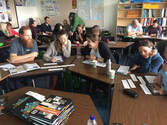
Curriculum Design for Creative and Critical Thinking (Social Studies)
This workshop focuses on the kinds of projects that result when passionate teachers get busy combining theory and practice. Examples will be drawn from various responses to the redesigned curriculum in BC by a teacher collective, including "manipulatives" (source-based) activities, interdisciplinary course development, place-responsive learning, and simulation games developed for BC Social Studies 9-11 and History 12. The participant activity centers on applying curricular competency problem-solving to primary sources. We will also ponder some of the thinking and design criteria behind high functioning classrooms and teacher cooperatives. 1.5-2 hrs
This workshop focuses on the kinds of projects that result when passionate teachers get busy combining theory and practice. Examples will be drawn from various responses to the redesigned curriculum in BC by a teacher collective, including "manipulatives" (source-based) activities, interdisciplinary course development, place-responsive learning, and simulation games developed for BC Social Studies 9-11 and History 12. The participant activity centers on applying curricular competency problem-solving to primary sources. We will also ponder some of the thinking and design criteria behind high functioning classrooms and teacher cooperatives. 1.5-2 hrs
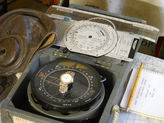
Dead Reckoning: Charting New Waters in Education
The remarkable and on-going "transformative" changes in our K-12 education system over the last years should give us cause for reflection. How did we get here? Where do we go next? Curriculum updates are just one concern for teachers alongside changing roles, baffling jargon, redesigned classrooms, incorporating indigenous perspectives, and political agendas that relate to the nature of public education. With a values-based pedagogy in mind, this talk looks at ways in which teachers, administration, and other professionals can foray into new educational territory and maintain joy, purpose, and humour. 50-60 minutes
The remarkable and on-going "transformative" changes in our K-12 education system over the last years should give us cause for reflection. How did we get here? Where do we go next? Curriculum updates are just one concern for teachers alongside changing roles, baffling jargon, redesigned classrooms, incorporating indigenous perspectives, and political agendas that relate to the nature of public education. With a values-based pedagogy in mind, this talk looks at ways in which teachers, administration, and other professionals can foray into new educational territory and maintain joy, purpose, and humour. 50-60 minutes
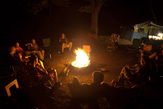
Professional Communities
How do you connect with others around professional goals? Is it possible to work with any group you find yourself in, or can you turn any individual task into a collective task? When is this a bad idea? This presentation examines some models and examples of professional learning communities, both face-to-face and virtual, and pushes discussion about contexts, technology, and identity. Prepare to have your "21st Century" language and assumptions challenged. Learn more about being a "critical friend." K-12 and Adult ed. 1.5-2 hrs
How do you connect with others around professional goals? Is it possible to work with any group you find yourself in, or can you turn any individual task into a collective task? When is this a bad idea? This presentation examines some models and examples of professional learning communities, both face-to-face and virtual, and pushes discussion about contexts, technology, and identity. Prepare to have your "21st Century" language and assumptions challenged. Learn more about being a "critical friend." K-12 and Adult ed. 1.5-2 hrs
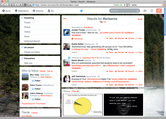
Social Media in Education
I was a designated BCTF facilitator for their version of this workshop/topic. Three areas of focus (pick one or more):
I was a designated BCTF facilitator for their version of this workshop/topic. Three areas of focus (pick one or more):
- SM Web Safety, SM Boundary Issues (professional/parent/child/employer), and technology work/like balance
- Using SM to build professional capacity (group/school/organization) and as a personal professional development tool
- Using SM with students -- blogs, facebook, twitter, etc. for communication, learning, portfolios, etc. 1.5-2 hrs
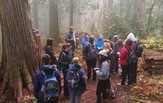
Connecting Students with Nature
Develop some strategies for making the most out of local opportunities in nature. Plant identification, traditional ecological knowledge (TEK), bushcraft, use of maps (paper and digital). Walking Curriculum (including Soundwalks). Connecting location to local and global issues. Sharpening the senses. Geographic Literacy and "reading" landscapes. This is a highly adaptable presentation that can be inside or out, close by or farther afield. 1.5-2 hrs
Develop some strategies for making the most out of local opportunities in nature. Plant identification, traditional ecological knowledge (TEK), bushcraft, use of maps (paper and digital). Walking Curriculum (including Soundwalks). Connecting location to local and global issues. Sharpening the senses. Geographic Literacy and "reading" landscapes. This is a highly adaptable presentation that can be inside or out, close by or farther afield. 1.5-2 hrs
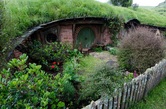
Middle Earth
Yes, you read that correctly. As an amateur Tolkien scholar and admirer of Hobbits, I have developed a presentation that explores how Middle Earth can be used as a teaching tool (lessons, units,etc.) to access diverse topics such as philosophy, language origin and usage, cultural anthropology, human and physical geography, environmental protection, and the writing process. Applications: Humanities and English 8-11, Social Studies 8, Geography 12, post-secondary Arts. 1.5-2 hrs
Yes, you read that correctly. As an amateur Tolkien scholar and admirer of Hobbits, I have developed a presentation that explores how Middle Earth can be used as a teaching tool (lessons, units,etc.) to access diverse topics such as philosophy, language origin and usage, cultural anthropology, human and physical geography, environmental protection, and the writing process. Applications: Humanities and English 8-11, Social Studies 8, Geography 12, post-secondary Arts. 1.5-2 hrs
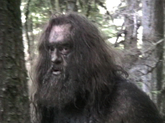
Sasquatch Studies
Yes, you read that correctly. The Bigfooted Denizen of the West Coast has a long and storied past. This workshop explores how the Sasquatch can used as core concept to guide mini-units in secondary Social Studies & English, and elementary Science & Humanities. Themes of Indigenous knowledge, ecology & conservation, literature and folklore, local/BC history, ways of knowing, and the work of "cryptozoologists" are covered. 1.5-2 hrs
Yes, you read that correctly. The Bigfooted Denizen of the West Coast has a long and storied past. This workshop explores how the Sasquatch can used as core concept to guide mini-units in secondary Social Studies & English, and elementary Science & Humanities. Themes of Indigenous knowledge, ecology & conservation, literature and folklore, local/BC history, ways of knowing, and the work of "cryptozoologists" are covered. 1.5-2 hrs
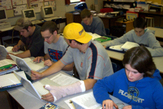
Learner Identity in a Digital Age
How has technology affected the teenage brain? How have our learners remapped the way in which they approach social learning and relationships, and how do they express their need for contact, regulation, and genuine connection? This workshop encourages educators to assess the debate between neurologists, developmental psychologists, and philosophers related to student identity. This is a serious update on the digital immigrant/native trope that no longer works to describe where we are at in education. 1.5-2 hrs
How has technology affected the teenage brain? How have our learners remapped the way in which they approach social learning and relationships, and how do they express their need for contact, regulation, and genuine connection? This workshop encourages educators to assess the debate between neurologists, developmental psychologists, and philosophers related to student identity. This is a serious update on the digital immigrant/native trope that no longer works to describe where we are at in education. 1.5-2 hrs
Facilitation and Curriculum Development
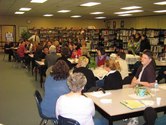
I am available to help plan, develop, and facilitate your professional learning session, conference event, or strategic meeting. In particular, I enjoy working with teachers to co-create professional development opportunities and help form growth plans. I also have experience with mentorship programs, organizational design, and program evaluation. I can also work with a team to put together a staff retreat or school planning day.
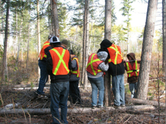
Available for educational research and writing, text and course authoring, document and resource review, and editing.
- conducting research at UNBC on place-responsive learning and climate education for teachers
- co-authored a source-based text for BC Social Studies 9 - Thinking it Through: A Social Studies Sourcebook (2018)
- developed a board-authority (locally authorized) Senior Humanities course (2013)
- implemented a English/Geography course combination program (2013)
- developed Distributed Learning version of BC Sustainable Resources 12 - Forestry course (2011)
- contributing writer for Pearson on BC SS11 Counterpoints textbook (2010); advisor for SS10 Horizons e-resources, reviewer for SS8 Pathways
- conducting research at UNBC on place-responsive learning and climate education for teachers
- co-authored a source-based text for BC Social Studies 9 - Thinking it Through: A Social Studies Sourcebook (2018)
- developed a board-authority (locally authorized) Senior Humanities course (2013)
- implemented a English/Geography course combination program (2013)
- developed Distributed Learning version of BC Sustainable Resources 12 - Forestry course (2011)
- contributing writer for Pearson on BC SS11 Counterpoints textbook (2010); advisor for SS10 Horizons e-resources, reviewer for SS8 Pathways
I have been fortunate to find out about and work with many other professionals and educational specialists -- if you have a workshop need and would like some suggested names to fit your topic, let me know and I can hook you up with someone that can help. Using Attachment to reach students in toxic stress, Social/Emotional Learning, Art Therapy, Sports Program Development / Coaching Theory, Data Analytics, Programming and App Development... if you are looking for Pro-D, let me connect you with an expert in the field.